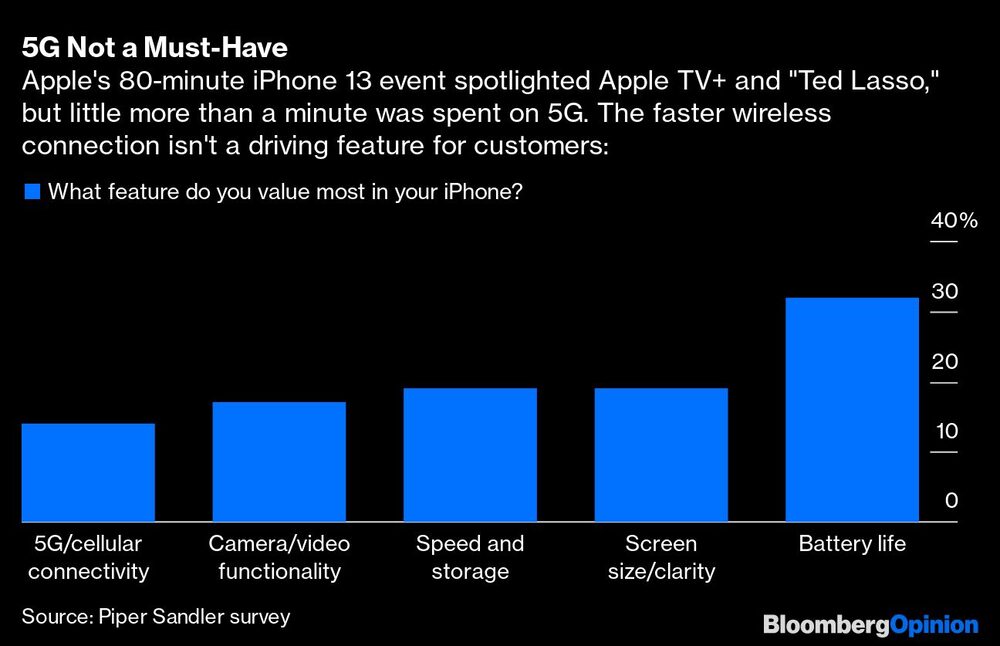Bloomberg Opinion — By Tara Lachapelle
Apple Inc. just won a well-deserved Emmy for best comedy for “Ted Lasso,” a feel-good series on Apple TV+. But the company’s chief product, the iPhone, is long past its own days of critical acclaim. As Apple leans back from being the world’s most consequential innovator to bundle media services instead, its continued monopoly power over the most important technology hardware in many people’s lives and its resulting complacency should frustrate consumers and the broader telecommunications landscape.
Apple, 14 years after releasing the first iPhone, is now a force to be reckoned with in Hollywood. “Ted Lasso,” which stars Jason Sudeikis, turned an easily forgettable requisite tile on the iPhone screen into a must-watch streaming-TV service. What had been a two-horse race between Netflix Inc. and Walt Disney Co.’s Disney+ now includes Apple TV+ — and it needn’t do much to secure its place considering already about a billion people carry around a six-inch Apple billboard most hours of the day.
And yet “carry” is the key word there. After Apple’s disappointing reveal of its iPhone 13 models last week, some have wondered whether today’s smartphones are so advanced that there’s little room for improvement. Each iteration is less remarkable than the last, with only minor enhancements this time such as longer battery life and better cameras to keep up with today’s influencer lifestyle. But because the iPhone is still something to be physically carried — and potentially dropped, shattered, left in a taxi or simply too big to squeeze into a small handbag — it’s hard not to believe there’s much more room for innovation in everyday mobile computing. Connected eyeglasses and smart watches are a step toward that, sure, but they’re a long way from improving upon the iPhone, let alone replacing it. If only Apple had the competitive incentive to come up with something better sooner.
That’s the problem when one company dominates a market. We learn to accept that this is the way and can’t envision how it could be better — which is supposed to be the job of the product designers and engineers at companies like Apple. Antitrust regulators under President Joe Biden are trying to create a more level playing field in the tech space, including in Apple’s domain, as well as e-commerce, internet search and social media. Their arguments, though, have focused on specific concrete instances of competitive harm because it’s much harder to illustrate the concept of suppressed innovation using economic models and data. Even so, it’s one of the most detrimental effects of monopolies.

It has to be at least somewhat frustrating for telecom carriers as they promote 5G, the next generation of wireless service. If new Apple products are failing to excite consumers, it becomes a harder proposition for them to upsell 5G wireless data plans — particularly when many people are still homebound because of the Covid-19 pandemic and place a greater value on home Wi-Fi. It’s no surprise then that AT&T Inc., T-Mobile US Inc. and Verizon Communications Inc. are providing generous incentives for customers to upgrade to the iPhone 13, practically giving it away free with certain qualifying trade-in offers. The carriers are competing to expand their subscriber bases to spread out the cost of 5G network investments and drive profits on data plans.

It’s telling that a pricey phone that once sold itself now needs such buying incentives — and that the ability to access 5G service isn’t enough of a reason to upgrade. Consumers and shareholders will only care about 5G if there are relevant applications and gadgets that require it. As of now, there aren’t. That means Apple’s innovation or lack thereof can directly impact the value of wireless networks.
And so if Apple — the most valuable company in the world — is busy making hit TV shows instead of breaking new ground in mobile computing, what becomes of 5G? More important, what becomes of consumer-tech innovation at all?
This column does not necessarily reflect the opinion of the editorial board or Bloomberg LP and its owners.
Tara Lachapelle is a Bloomberg Opinion columnist covering the business of entertainment and telecommunications, as well as broader deals. She previously wrote an M&A column for Bloomberg News.

